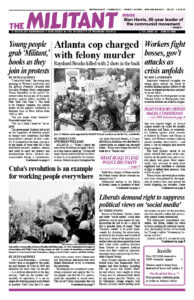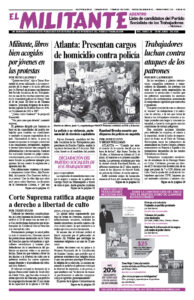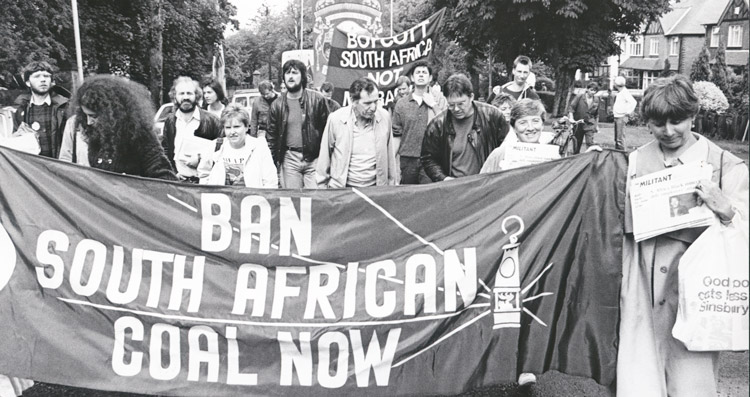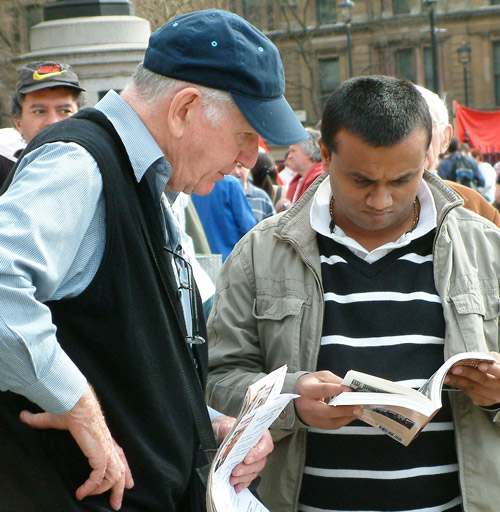LONDON — “Alan Harris was a proletarian party-builder,” said Jonathan Silberman, organizer of the Central Committee of the Communist League in the United Kingdom, welcoming people to a gathering here May 31 to celebrate Harris’ life and political contributions.
“Alan was an internationalist, immersed in the class struggle at home at the same time as he worked with others to build the world communist movement. For him the two were inseparable.”
A 65-year veteran leader of the communist movement, Harris died March 26 after contracting coronavirus in a hospital where he was being treated following a major stroke. He was 86.
The course Harris exemplifies, Silberman said, is “necessary today as the rulers step up efforts to make working people pay for the deepening crisis of capitalism — with tens of millions thrown out of work worldwide, devastating cuts to the livelihoods of farmers and other small producers, and assaults on workers’ rights.”
Harris’ political life was featured at the gathering with an attractive photo display. Participants were also able to read the more than 30 tributes to Harris sent by comrades and Communist League leaders in Australia, New Zealand, Canada, the U.S. and the U.K.; by the Talaye Porsoo publishing house in Iran; and by Harris’ stepdaughter, Sue Mohammed.
Working-class fighter, revolutionary
Harris was born in the depression year of 1933 to a working-class family in Lincoln in rural East Midlands.
Like all 18-year-old workers of his generation, he was conscripted into the British army. There he learned from fellow soldiers returning from Korea that the “British interests” peddled by the Labour Party government, in pursuance of their participation in the U.S. rulers’ war, masked what the United Nations “police action” was about. Alan discovered we’re not “all in this together,” Silberman said. Korea’s workers and farmers were struggling to throw off decades of colonial and imperialist oppression, liberate their nation and put an end to capitalist exploitation.
Who “we” are and who “they” are was a lesson Harris took with him when he emigrated to Canada in 1955, getting work as a truck driver. In Toronto he walked into the Vanguard Bookstore, organized by communists who formed the Canadian section of the Fourth International. Harris joined the party — which became the League for Socialist Action a few years later — and soon became one of its leaders. A member of its fraction in the Teamsters union, Harris stood as the League’s candidate in the Toronto municipal election in 1960 and became a full-time party organizer.

The 1959 Cuban Revolution was an acid test for revolutionists the world over, and Harris was an ardent supporter from the start. He was a delegate from Canada to the 1963 world congress of the Fourth International that reunified communist forces based on a common response to the revolutionary triumph led by Fidel Castro and the July 26 Movement. That same year he also traveled to Algeria to see firsthand and bring support to the revolution unfolding there, under the Ahmed Ben Bella leadership of the National Liberation Front.
The former U.K. affiliate to the Fourth International, the Socialist Labour League, was bitterly opposed to the Cuban Revolution and split before the reunification congress. Harris responded to a call from the international leadership to return to the U.K. to throw himself into politics and the class struggle here and help rebuild a party. Together with his wife Connie, a member of the communist movement in Britain since 1943 who died in 2007, he founded a book center that later became Pathfinder Books and helped win young people to the movement.
He and Connie returned to Canada in 1966, settling in Vancouver where Alan became the organizer of the LSA branch. In 1968, as the party in the U.K. began recruiting significant new forces, they once again crossed the Atlantic to continue party-building work there.
Alan became a full-time volunteer for the Vietnam Solidarity Campaign, helping to build protests against London’s complicity with Washington’s war. Connie Harris spoke at the Aug. 21, 1968, protest outside the Soviet Embassy, called within hours of Moscow’s invasion of Czechoslovakia that snuffed out the “Prague Spring” uprising against the Stalinist regime. The book center was a vital source of communist literature for revolutionaries in France during the May-June 1968 student upsurge and general strike.
“The International Marxist Group, a predecessor of the Communist League in the U.K., emerged out of the efforts of Alan and his collaborators,” Steve Penner, organizer of the League’s sister party in Canada, wrote in greetings to the meeting. “A true internationalist, Alan played an important role at different times in the leadership of the party both in Canada and the U.K., as well as of the Fourth International.” For more than 15 years, Harris was a member of the Fourth International’s executive body, the United Secretariat.
‘Behind class contempt was fear’
In the early 1970s the reunified International was deeply divided by the anti-working-class course adopted by a majority of its sections in Europe and Latin America. Alan and Connie, who opposed that course, became the target of factional attacks by leaders of the Fourth International in Europe and their ultraleft supporters in its British section, Silberman said.
Those attacks were “a manifestation of class contempt for proletarian cadres,” wrote Jack Barnes, national secretary of the Socialist Workers Party in the U.S., in a message to the meeting from himself and SWP leader Mary-Alice Waters. Both Barnes and Waters worked closely with Harris for many years as part of the International’s leadership.
Underneath the majority’s treatment of Alan and Connie, however, “was fear of them as a dangerous ‘European’ beachhead of the ultimate target — the Socialist Workers Party and the continuity of the communist movement back to the Bolshevik Revolution and founding years of the Communist International,” the SWP leaders wrote.
Alan and Connie never responded in kind. They played a decisive role within the IMG, later renamed the Socialist League, in the yearslong struggle to establish a party in the U.K. with a proletarian membership, program and course of conduct. Without that fight, “what became the growing number of comrades in the U.K. who were won to a proletarian course in those years, the Communist League would not exist today,” Barnes and Waters said.
‘A man of principled politics’
“Throughout his life as a communist revolutionary, Alan Harris was a man of principled politics,” the message from the SWP leadership emphasized. “His political enemies often thought his kindness toward others, carefully chosen words, and hatred for factionalism, duplicity, and demagogy registered political weakness. They soon learned to their dismay there was a core of steel underneath — a working-class strength that guided his activity.”
That “core of steel” bore its fruit in the regroupment of forces in the Socialist League following the 1979 world congress of the Fourth International. Led by the SWP, that congress adopted what became known as the turn to industry, the decision that our parties must be rooted in the industrial working class and industrial unions. The “pro-turn” forces won a majority in the party in the U.K. The minority, however, promptly declared the majority “expelled,” and the Communist League was born.
Throughout the long political battle, Silberman said, Harris acted as a “citizen of time,” confident in the victory of the communist program.
Books by revolutionary leaders
A key part of that struggle for a proletarian party was organizing to distribute books containing the communist program and lessons of past working-class battles. Harris was a steward of that endeavor for many years.
It was in the course of workers’ struggles in the 1980s that the cadres who founded the CL “learned to place priority on getting books by revolutionary leaders into the hands of fight-minded workers,” Pete Clifford told participants. Clifford worked under Harris’ leadership in the Pathfinder Distribution Center in London in the latter 1980s and is today the organizer of the League’s Manchester branch.
During the 1984-85 coal miners strike, “many of us virtually lived on the picket lines, as we had through the preceding steelworkers strike and struggles by engineering workers,” Clifford said. “We promoted books like Teamster Politics by SWP leader Farrell Dobbs, which enabled us to see that a decisive lesson of the miners’ battle was the need to fight for a workers’ party independent of the capitalist class. We organized meetings to promote Che Guevara and the Cuban Revolution and Thomas Sankara Speaks, as well as speaking tours by Cuban leaders.”
On a sales trip to Northern Ireland in 1988, Clifford had been arrested and detained by occupying British forces, facing frame-up accusations of terrorist offenses. Protest messages were sent from around the world that won Clifford’s release within 24 hours. Alan Harris led a delegation to Ireland that included the Member of Parliament where Clifford lived, union leaders and others, delivering hundreds of Pathfinder books to Irish prisoners.
“Alan took the lead in the early 1960s in distributing hot-off-the-press copies of The Second Declaration of Havana by Fidel Castro and the Tripoli Programme of the developing Algerian Revolution,” Ólöf Andra Proppé, another leader of the CL in Manchester, told the meeting. “At the same time, he participated in Hands Off Cuba activity and the international campaign in defense of Algeria’s war orphans.”
One of some 30 messages to the meeting from around the world came from Greg McCartan in Norway, who wrote about working with Alan at a book fair in Harare, Zimbabwe, in 1989, helping to get the communist program into the hands of anti-apartheid fighters in South Africa.
A message from SWP National Committee member Norton Sandler in Los Angeles pointed to Harris’ leadership in “shoe leather” work to visit commercial bookstores and get orders. The Pathfinder office in London has also been central to expanding the circulation of its books at the Tehran International Book Fair, and more recently at book fairs in Baghdad, Iraq, and Erbil in the Kurdish region.
Clifford described how years before, as a party leader in Canada, Harris had joined what they called “Trailblazer” teams — party members who went out on the road for several weeks at a time, traveling to cities, small towns and rural areas across the country campaigning with the party press and books by communist leaders.
Alan sold books, but “he was not a book seller,” Communist League leader Catharina Tirsén told meeting participants. “He was a party-builder who got out the communist program across Europe and around the world, helping to attract revolutionary-minded young people like myself to a working-class perspective.”
The celebration wrapped up with a fine spread of food and a special collection in Alan Harris’ honor that raised 2,800 pounds ($3,500) for the work of the Communist League.



